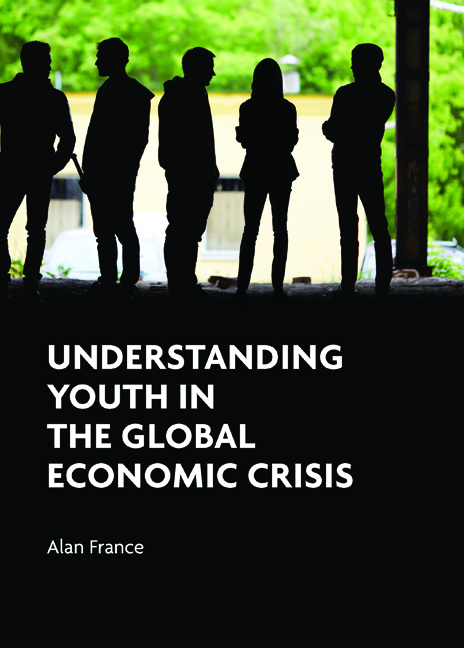Book contents
- Frontmatter
- Dedication
- Contents
- List of tables and figures
- About the author
- Acknowledgements
- Introduction
- One A political ecology of youth
- Two The global crisis and the ‘age of austerity’
- Three Education and training: the broken promise
- Four Education and training: from public good to private responsibility
- Five Unemployment and work: precarious futures
- Six NEETs and the disengaged: the ‘new’ youth problem
- Seven Divergence and difference: contrasting cross-national experiences of being young
- Eight Education, work and welfare in diverse settings
- Nine Youth and mobility: inequality, leaving home and the question of youth migration
- Ten After the crisis: social change and what it means to be young
- References
- Index
Nine - Youth and mobility: inequality, leaving home and the question of youth migration
Published online by Cambridge University Press: 01 September 2022
- Frontmatter
- Dedication
- Contents
- List of tables and figures
- About the author
- Acknowledgements
- Introduction
- One A political ecology of youth
- Two The global crisis and the ‘age of austerity’
- Three Education and training: the broken promise
- Four Education and training: from public good to private responsibility
- Five Unemployment and work: precarious futures
- Six NEETs and the disengaged: the ‘new’ youth problem
- Seven Divergence and difference: contrasting cross-national experiences of being young
- Eight Education, work and welfare in diverse settings
- Nine Youth and mobility: inequality, leaving home and the question of youth migration
- Ten After the crisis: social change and what it means to be young
- References
- Index
Summary
Introduction
In this chapter we examine some of the broader consequences of the changes identified previously. Our focus in this discussion is on the idea of ‘mobility’. Its usage here is broad and our aim is to examine the underlying practices and processes that underpin the ability of the young to be mobile in different contexts (Holdsworth, 2009). We begin with the notion of social mobility or the ‘categorical movement up or down the scale of socioeconomic classes’ (Sheller, 2011, p.1), in which we examine the nature of inequality; in particular, the impact recent changes resulting from the crisis and recession are having on social mobility. The discussion will also re-examine how inequality between social groups in all of our case study areas has been playing out, showing that one of the major consequences has been that social mobility for the young remains limited, and this tendency is entrenched and shaped by the continued impact of class, gender and indigenous inequality. The second part of the chapter will explore the issue of mobility through young people's relationships with leaving home and gaining independence. Moving into independent living is seen as a critical stage in the process of growing up (Jones, 2009a); how the recession has impacted on this is therefore important for our understanding of young people's lives. Finally, we will turn our attention to geographical mobility and in particular to international migration, where young people ‘move from one country, state or nation to another, to reside elsewhere at least on a temporary basis, often more permanently, the purpose being more than a visit or tourism’ (O’Reilly, 2012, p.1). Mobility research of this nature is concerned with a wide range of groups and processes (Sheller and Urry, 2006; Urry, 2007), but our focus here is specifically on the shifts that have been taking place among high- and low-skilled young migrants, and on the movement of international students. The young are more likely than any other group to be migrants and, again, the crisis and recession has seen major changes in this experience for young people.
Mobility: social mobility, inequality and the crisis
Thomas Picketty (2013), in his book Capital in the twenty-first century, gives us an interesting perspective on inequality.
- Type
- Chapter
- Information
- Understanding Youth in the Global Economic Crisis , pp. 217 - 244Publisher: Bristol University PressPrint publication year: 2016



